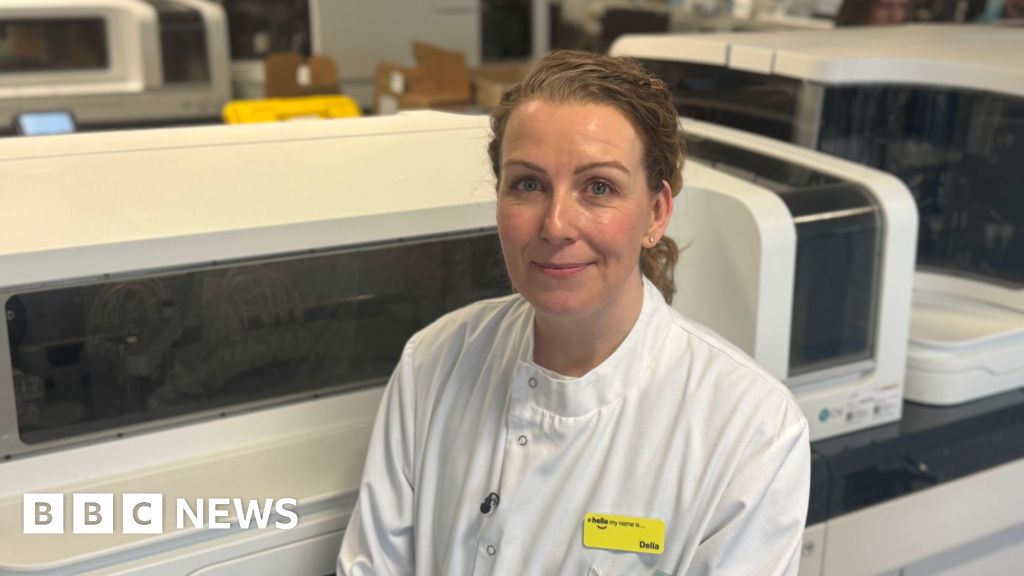
For the past year I’ve been posing as Dan Jones – a member of the far-right group Patriotic Alternative (PA).
I’ve attended protests, a summer camp filled with families, a secretive conference, and when I told them I was sofa-surfing, the group even found me a job.
What I heard while undercover was talk of race wars, threats of violence against migrants, and people planning to arm themselves.
The evidence I secretly filmed has led to calls for a police investigation, and separate calls to change the law and ban the group.
Warning: This article contains graphic accounts of racist and violent language
I had been following members of PA online for months before joining the group.
PA’s organiser in Wales, Joe Marsh, was a veteran member of the far-right who’d had many previous guises, including in the British National Party (BNP) and as a football hooligan.
He was involved with protests outside a hotel in Llanelli, which had been set to house hundreds of asylum seekers.
I wanted to meet him to find out what he would say in private to someone who wanted to join PA.
I chose a fake name, practised my backstory – that I was a sofa-surfing delivery rider who’d been through a bad break-up – and sent my details to PA.
It took less than 24 hours for Mr Marsh to message me.
He invited me to meet him for breakfast in Swansea ahead of a protest against drag queens.
He told me he invited anyone who wanted to join PA to first meet him on his own, joking “you don’t know whether you’ll end up on Wales”.
My stomach dropped.
After a few hours, it felt like I had passed a test. Before I left, he asked if I was following his social media accounts. Then the messages started.
Some were direct to me, some to the groups to which I was added.
They were relentless – day and night, from Mr Marsh and others in the group. And almost every single message was about race.

Some were racist memes.
For example, a drawing of a policeman handing a note to someone at their door.
The note read: “So… we decided to let a Pakistani rape your daughter. Here’s why.”
And there was a constant stream of links to news stories about black and Asian people convicted of crimes.
After a few weeks, I was invited to join PA members for a so-called banner drop – members gathered for no more than about an hour near a road, to wave flags branded with PA logos and other messages.
The messaging on the banners was often fairly benign – they didn’t want to attract the attention of police or counter-protesters.
But the actual conversations I heard were very different.

At my first banner drop, a former civil servant and PA member called Aaron Watkins asked me whether I could fight. He told me I should learn, saying it would be good for me to know I could kill a person.
On another occasion, Roger Phillips – who wasn’t a PA member but attended some of their protests – told me he was buying a pump action shotgun, asking me “who else is going to fight migrants?”
About nine months after joining PA, I was invited to attend the group’s “summer camp”.
About 150 of us – including men, women and children – descended on a campsite in Derbyshire for three days, under the guise of being a hiking association.
The group took over a big section of the campsite and decorated the area with regional flags.
All the leaders of the organisation were there, such as founder Mark Collett and deputy Laura Towler.
Members came from all over Britain. Lots of people brought their children with them and they were allowed to run around the campsite and play while the group discussed things such as the white replacement conspiracy and used racial slurs.
We weren’t the only ones on the campsite.
There was a big scout group next to us who ended up moving because they said the kids felt intimidated by PA.
When that happened, the campsite owners threatened to throw Patriotic Alternative out.
One morning, we went on a group hike, with almost everyone carrying PA flags. We reached the top of one mountain and stopped for a while, before noticing a small group of men of south Asian heritage behind us who happened to be hiking in the same direction.
The hike culminated in unveiling two massive banners on top of a local peak. One read “We will not be replaced” and another read “White Lives Matter”.
One of the last things I did was attend PA’s “special conference”, in October.
It was a three-day event, a lot like a political conference, at a hall the group had hired under the guise of a 50th birthday party.
A few hundred members turned up and there were banners everywhere, as well as speakers from other countries.
One speaker was Blair Cottrell, from Australia – a man with a string of convictions. After his speech, I went to sit at the table he was at.
He spoke about a black criminal in Australia.
He said: “You can’t reason with them, you have to use brute force.”
And as a deterrent, he then made a sickening suggestion: “Literally skin them and hang a few of their bodies up across some traffic lights.”
He said he was speaking theoretically, but added: “That is practically the most effective way to actually send them a message.”
Many of the PA members around him seemed full of admiration. I asked one – Patrick, a former history teacher – whether he bought into the idea of a race war.
He said it was inevitable and, for those migrants who refused to leave the country, “the only way to get rid of them will be to kill every single one of them”.
Secret filming
The undercover operation wasn’t without stress or issues and being undercover for so long took its toll. I was always over-thinking, always tense and my phone was always pinging.
Soon after joining, I started wearing a hidden camera.
Once, while I was at a house in south Wales with Mr Watkins – who had offered me a day’s work helping with a decorating job – I thought I was recording him, until I went to the toilet and realised my camera wasn’t working.
I told him I needed to go outside to call my mum, but instead rang my producer for help.
My colleagues scrambled to find a solution, eventually dropping a new camera into a nearby bush for me to find.
As we worked, Mr Watkins told me he believed migrants coming to the UK should be put into camps until they agreed to leave the country. He suggested those who refused should be shot.
He also admitted to burning his old phone on a BBQ before anti-terrorism police could find it.
Civil servants and NHS workers
At the end of the year, the moment came when our team approached the PA members and revealed the evidence we had against them.
We never told them there had been an undercover journalist, but within 30 minutes they worked out that it was me.
I was kicked out of the private messaging group I’d been added to, and my burner phone fell completely silent. That was that.
Looking back, perhaps the biggest surprise was that many members of PA were not who I expected them to be.
Many were well educated – including a former history teacher, civil servants and NHS workers. They were organised, with leaders in charge of groups across every region of Britain and a centralised leader in Mark Collett.
They’ve tried unsuccessfully to register as a political party. Now their plan, according to leader Mark Collett, is to win people’s trust by engaging in “local activism”.
He said: “Because if you are working in a shitty nine-to-five job worrying about money… then, all of a sudden, you’re worrying about if your daughter is going get raped cos there’s 250 men of fighting age who’ve just turned up eyeing her as she walks to school.
“And then a group who comes in gets it shut down and removes that worry, that’s a positive in people’s lives.”

The group is also fundraising for convicted criminals, like those jailed after the Southport riots.
At least three members I spoke to had been referred to Prevent. But their views clearly hadn’t changed.
Now it’s all over, I’m much more cautious than I used to be. I feel I have to be careful and more aware than before.
Ultimately, the people I met at PA don’t know my true identity – but they know what I look like.
A barrister who has written books on extremism has said some members I recorded could be investigated for inciting racial hatred, and there are calls for the law to change to ban groups like PA who might be spreading hate.
Leader Mark Collett said they were not extremist, did not promote violence and peacefully campaigned for the rights of what he called indigenous British people.
I don’t have any regrets. It feels like, whatever happens, PA members or others like them will continue to find ways to do what they do.
That’s why it’s important to keep showing people who is behind the mask.
If you have been affected by any of the issues raised in this story you can visit Action Line.




